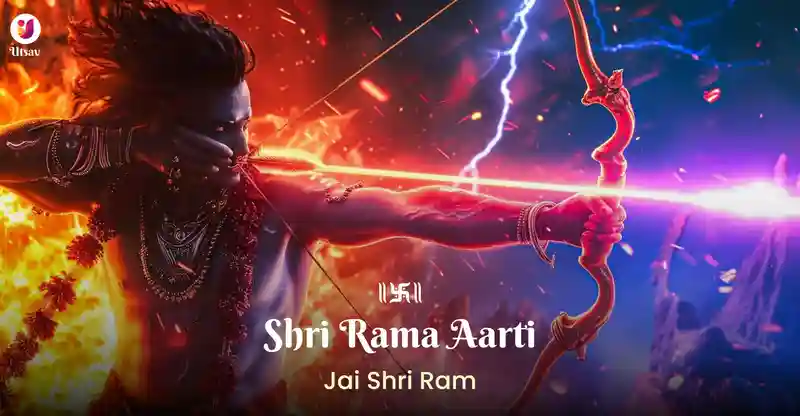Shree Ram Aarti - Benefits, special occasion and when to recite
Fri - Apr 26, 2024
3 min read
Share
Shri Ram Chandra Kripalu Bhajuman Aarti is a devotional song dedicated to Lord Rama, the seventh incarnation of the Hindu god Vishnu. It is usually sung by devotees during prayer rituals, especially in the evening. Aarti glorifies the divine qualities and virtues of Lord Rama and expresses gratitude for his blessings and protection. The soothing tune and heart-touching lyrics of this aarti evoke a feeling of devotion and reverence towards Lord Rama, inspiring spiritual upliftment among the worshippers.

Aarti
Shrī rām chandra kṛupālu bhajaman haraṇ bhāv bhaya dāruṇam।
Navakanja lochan kanja mukhakara, kanja pad kanjāruṇam।।
Kandarpa agaṇit amit chhavī nav nīl nīraj sundaram।
Paṭpīt mānahu taḍit rūchi shuchi naumī janak sutāvaram।।
Bhaju dīn bandhu dinesh dānav daitya vansha nikandanam।
Raghunanda ānanda kanda kaushal chanda dasharath nandanam।।
Sir mukuṭ kuṇḍal tilak chāru udārū aanga vibhūṣhaṇan।
Ājānu bhuj shar chāp dhar sangrām jit khara-dhūṣhaṇan।।
Iti vadati tulasīdās shankar sheṣh muni man ranjanam।
Mam hradaya kuanja nivās kuru kāmādī khal dal ganjanam।।
Manu jāhian rācheū milihi so baru sahaj suandar sāvaroan।
Karunā nidhān sujān silū sanehū jānat rāvaro।।
Ehī bhāantī gaurī asīs sunī siya sahit hiya haraṣhī alī।
Tulasī bhavānī pūji pūnī pūnī mudit man mandir chalī।।
Jāni gaurī anukūl siya hiya haraṣhu n jāi kahi।
Manjul mangal mūl vām aanga farakan lage।।
Shrī rām chandra kṛupālu bhajaman haraṇ bhāv bhaya dāruṇam।
Navakanja lochan kanja mukhakara, kanja pad kanjāruṇam।।
Benefits
The "Shri Rama Chandra Kripalu Bhajuman" Aarti can be sung on various special occasions and during specific times. Here are some examples:
1. Daily Worship: It is often sung as part of daily worship rituals in homes or temples dedicated to Lord Rama. Many devotees incorporate it into their morning or evening prayers.
2. Ram Navami: This Aarti holds special significance during Ram Navami, the birthday celebration of Lord Rama. It is sung with great devotion and fervor during the festivities.
3. Rama Janmabhoomi Pujan: On occasions related to the worship or celebration of Rama's birthplace, such as the groundbreaking ceremony (Bhoomi Pujan) for the construction of a temple or any related ceremonies, this Aarti can be sung.
4. Ramayana Recitations: During gatherings where the Ramayana, the epic story of Lord Rama, is recited or discussed, singing this Aarti can be a fitting way to conclude the session and honor the divine qualities of Lord Rama.
5. Ram Katha or Satsang: In spiritual discourses or gatherings where the life and teachings of Lord Rama are discussed, singing this Aarti can evoke devotion and reverence among the participants.
6. Festivals: It can also be sung during other festivals dedicated to Lord Rama, such as Diwali, as part of the celebrations.
7. Personal Prayer: Individuals may choose to sing this Aarti during personal moments of prayer and meditation to seek blessings from Lord Rama and express their devotion.
Special occasion and when to sing:
1. Daily Worship: Included in morning or evening prayers, as part of daily worship rituals.
2. Ram Navami: Celebrated during Lord Rama's birthday festivities, it's sung with great devotion and fervor.
3. Rama Janmabhoomi Pujan: During ceremonies related to Rama's birthplace, such as groundbreaking ceremonies or temple constructions.
4. Ramayana Recitations: After discussions or recitals of the epic Ramayana, as a way to conclude and honor Lord Rama.
5. Festivals: Sung during festivals dedicated to Lord Rama, such as Diwali or other Rama-related celebrations.
6. Personal Prayer: Chosen for individual moments of prayer and meditation, as a means to seek blessings and express devotion.
7. Sing Ram Aarti during the evening, typically around sunset, as a devotional practice to honor Lord Ram and conclude the day with spiritual reflection and reverence.
Share